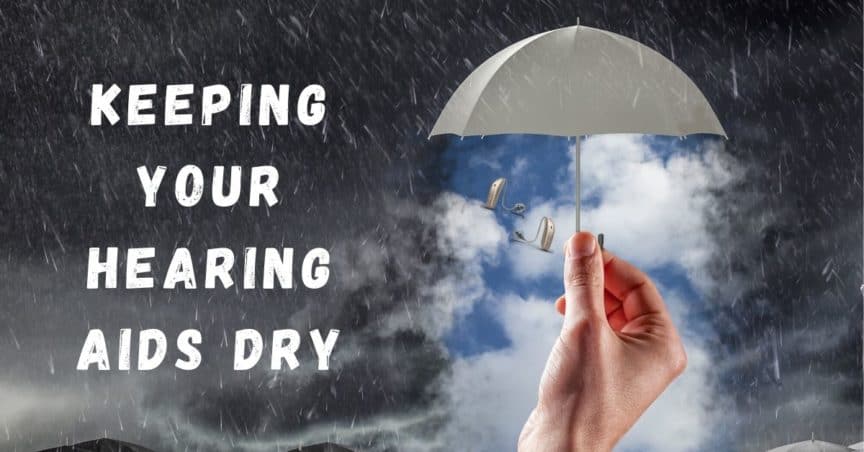Though hearing aids are designed to be durable and there are features that provide extra protection, exposure to moisture can be damaging. There are daily activities that you may participate in that can impact your hearing aids: swimming, running, hiking, biking etc. Also, now that it is officially summer, you could find yourself sweating more from the heat. Keeping your hearing aids dry is a crucial part of maintaining best care for your device. Moisture can impact the quality and longevity of your hearing aids so it is important to be proactive about keeping them dry!
How is Water Damaging?
Hearing aids have a protective coat that provides resistance to moisture. This means that your device is able to resist water to some degree but not completely waterproof. This allows hearing aids to work for a longer period of time but they could be eventually impacted by moisture.
We know that water and electronics simply don’t go together! This is because the ions and impurities in the water the device absorbs, affects the electrical currents and circuits that keep your device running well. This can cause an electrical short and damage various components of your hearing device. Moisture build-up can also cause the metals in your hearing aids to weather, which over time causes the device to not work efficiently or stop working completely.
Daily Cleaning
The most common kind of moisture hearing aids are exposed to is the accumulation of sweat. The best way to prevent this build-up and keep your hearing aids dry is to clean them daily. An effective way to do this is:
- in the evening when you remove your hearing aids, use a dry cloth
- thoroughly remove any earwax and/or moisture
- you can use a brush to get in any crevices
- open the battery compartment to make sure it is dry
- keep your hearing aids near you and in room temperature overnight
Cleaning your hearing aids daily can drastically help keep them working effectively, preventing you from getting repairs or replacements.
Keeping Hearing Aids Dry
If you live an active lifestyle, live in a more humid climate, or sweat easily, you might want to take extra steps to keep your hearing aids dry. Using a dehumidifier (or drying box)
is an incredibly useful (and easy) way to remove any moisture from our device. These small accessories use UV light to dry hearing aids. After removing and cleaning your device, you place the hearing aids in the dehumidifier overnight and in the morning, your hearing aids will be both dry and sanitized. If your hearing aids are rechargeable, you can actually get a charger that is also a dehumidifier!
Other Tips to Prevent Water Damage
In addition to cleaning hearing aids daily and using a dehumidifier, there are other ways you can keep your device as clean and dry as possible. A few tips include the following:
- a water-resistant hearing pouch is another accessory that protects your device from moisture damage (as well as other debris).
- avoid swimming and showering with your hearing aids. Use ear plugs when you swim and make sure that your ears are thoroughly drained before placing your hearing aids back in.
- if you ever find yourself in a situation without your dehumidifier, you can use a hair dryer but make sure it is placed on the lowest setting
- if you get caught in the rain, be sure to dry your hearing aids immediately after
Hearing aids are designed to withstand normal amounts of water exposure but not large quantities. It is important to be proactive about the maintenance and care of your hearing aids to ensure optimal function.
People typically replace their hearing aids every 3-5 years. Water damage can cause static or distorted sound and complete outages causing you to replace your device sooner. By keeping your hearing aids dry and cleaning them daily, you are helping your device last longer. Additionally, this helps with better sound and allows you to hear with clarity. Your hearing aids are an investment and are critical for your hearing health. By keeping them dry and caring for them effectively, you are ensuring their quality!

